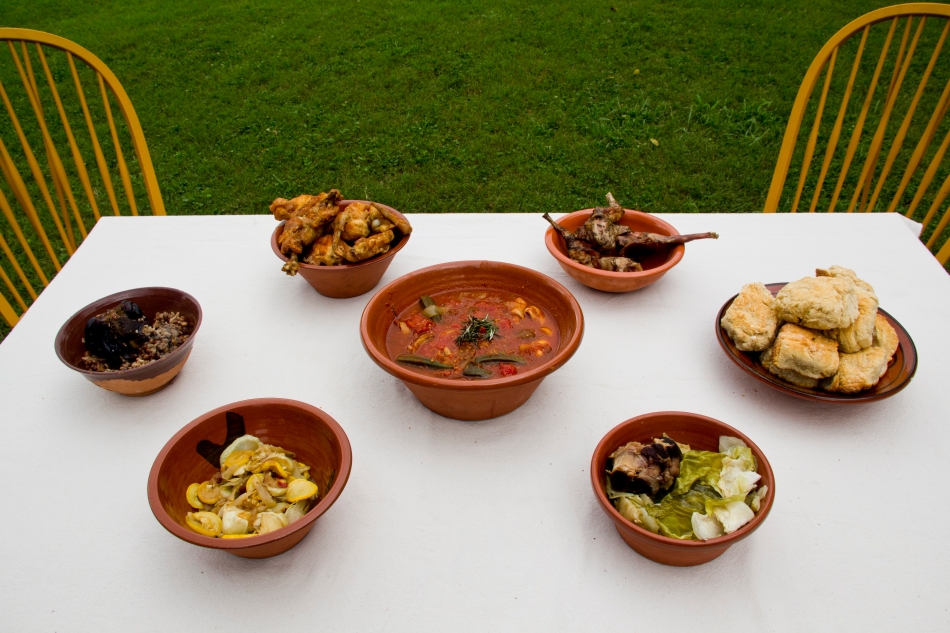To Know a Man From Paper: Remembering John Egerton (1935-2013)
“…From those times hence, memory and habit have led succeeding multitudes to eat, drink and be merry; thinking, perhaps, that tomorrow the hard times might return, and they might die. Given such circumstances, our food has been a powerful reflection of our history, an open window on the daily joys and sorrows of our lives, a constant reminder of who we are and where we came from. The appeal of Southern cooking transcends the barriers race, class, sex, religion, and politics. Here in this historically unique region of the United States—unique for great many reasons, good and bad—food has been perhaps the most positive element of our collective character, an inspiring symbol of reconciliation, healing and union.” From Southern Food: At Home, on the Road, in History, 1993.

IN the sacred Jewish texts (Tanchuma, Veyakhel 1) it is said that a person is called by three names; one given by their parents, one that is bestowed upon the person by neighbors and friends, and one which the person acquires for themself. “The greatest of these names,” says the Tanchuma, “is the one that is self-acquired.” To further the point, a great scholar is known by their best and most influential work. Great rabbis of the past are known as The Ben Ish Chai, the Chatam Sofer, the Choftez Chayyim; these names may mean little to those outside of traditional Judaism and Jewish learning but they reflect a sense of memory that is passed on through recalling what each figure has added to the Jewish mind. But this is not a Jewish in memoriam, this is a Southern one. One of the great figures of the Southern mind died last week, and he was John Egerton, who I will now call, Southern Food: At Home, on the Road, in History.
It is fitting that his name in infinite memorial should be the title of his best known, most influential and critical volume, Southern Food. Southern Food’s work was Mason-Dixon wide and Mississippi deep; but his 1987/1993 classic text was encyclopedic, heavy, responsive, generous and inclusive. I never had the opportunity to meet Southern Food, but his influence has certainly touched every food writer of the genre, not the least of which because he was one of the founders of the Southern Foodways Alliance. Indeed, there may not have been an Afroculinaria or a Michael Twitty if it were not for the clear and scholarly voice he bestowed upon his native victuals. He was a well-seasoned journalist, he documented the shift in Southern life from segregation to Civil Rights and beyond and as part of his work and interest in social change, the New South, food and Southern culture, traveled the region in search of its meaning and soul.
Southern Food’s work was incredibly democratic. It looked for the meaning and matter of his home civilization in every morsel and recipe. Lane cake, Country Captain, congealed fruit salad, sawmill gravy, guava jelly, boudin and café brulot…none escaped his radar as he tried to tell the story of how British, French, West and Central African, Native American, Minoran, Acadian, Creole, Chinese, Greek, Jewish, Mexican, Lebanese and others came together to feed the Southern soul. He did not shy away from the South and its shames, rather he showed the whole picture, and retained pride in the constant push towards redemption. In menus, in receipts and recipes, in people, in restaurants, in pictures, in places, in prayers, he wove together the Odyssey of Southern food and earned his name well.
And yet to me, Southern Food will always be my personal guide to the buried treasure of my constantly moving, self-loving, embattled motherland. Like the rabbis of old, he has not truly passed, rather he has fulfilled his immortality, and Southern Food will be with me ever more as I travel the roads looking to preserve and defend the ancestral voices that serve as board of directors for my work. Like them, I will comment on him, correct him, defy him, quote him, counterpoint his voice and affirm his truths. To give due honor to a great scholar is to not stop studying them; questioning them, arguing with them, and at the end of the day having a plate of delicious food and divine drink with them. From generation to generation our texts have been few that dared make our collective memory permanent, but from now on, the cornerstone has been laid and the temples of mind and belly shall forever be strong.
With due respect to the great scholar John Egerton, a righteous man with holy fingers and a taste for history. L’Chayyim, Southern Food.
Beautiful.
Karen
LikeLike